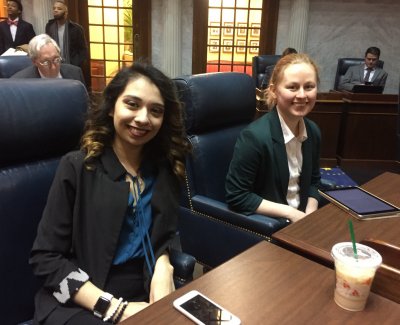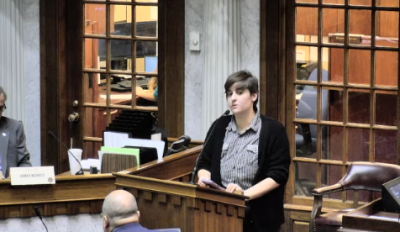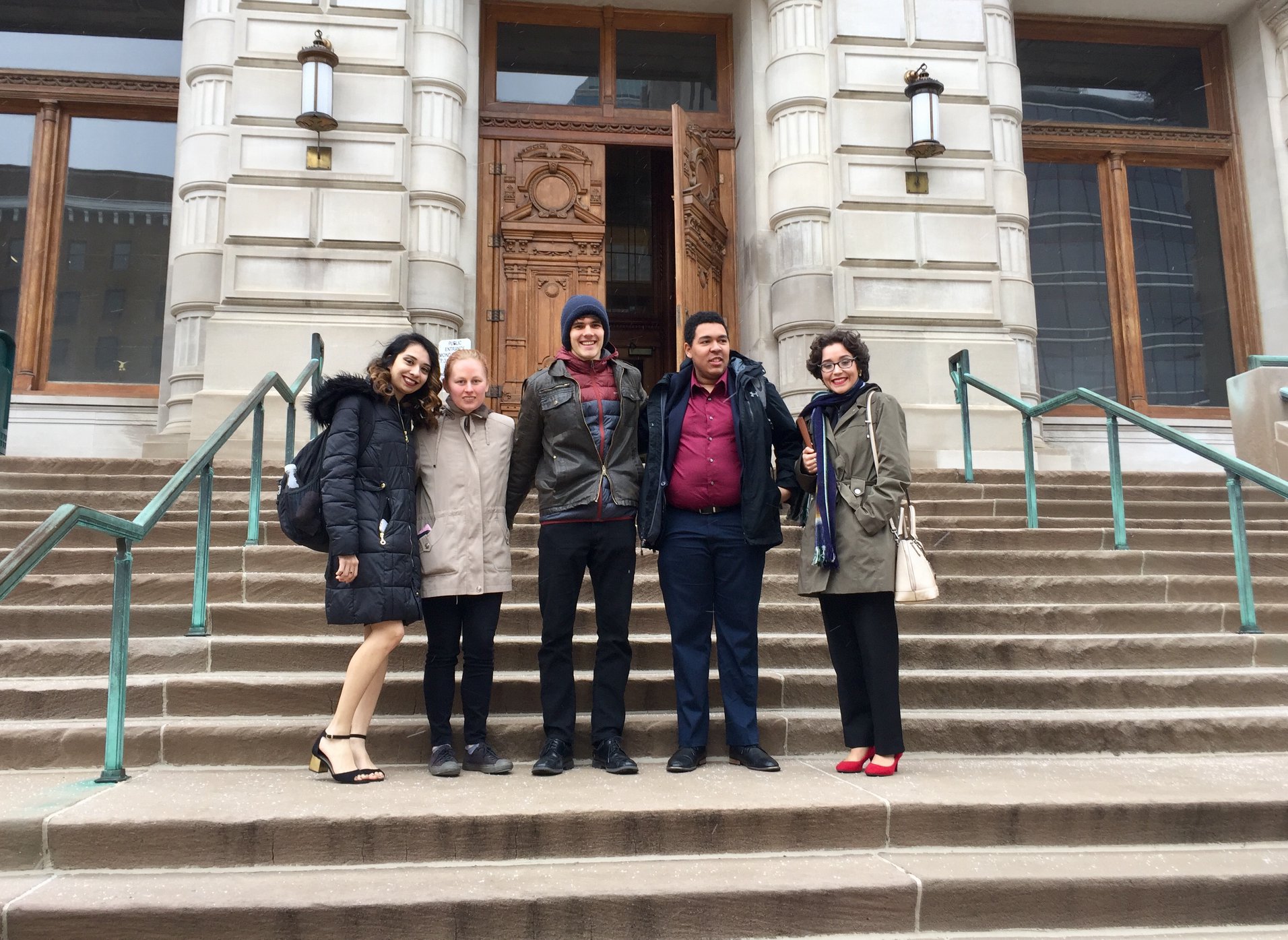Goshen College community members advance social justice at state capitol

Sharing painful personal experiences, six Goshen College students and an administrator told members of the Indiana Senate on Monday, Feb. 18, that it is past time for the Hoosier state to pass a law allowing judges to impose stricter sentences for those convicted of threatening or harming people or damaging their property because of their age, ancestry, race, ethnicity, sexual orientation, gender identity, disability or religion.
Emily Bennett, Zack Begly, Sandra Cortez, Gabe Miller, Lizeth Ochoa and Christi Sessa, along with Community Impact Coordinator Richard R. Aguirre, testified in support of Senate Bill 12 during a hearing of the Senate Public Policy Committee at the state capitol in Indianapolis. Senators approved SB 12 on a 9-1 vote, sending it to the full Senate for consideration, after nearly three hours of intense testimony by about 40 supporters and opponents. Witnesses, spectators and news media representatives packed the third floor Senate chamber and the fourth floor gallery.
Monday’s public hearing was the first for a hate crimes bill during the 2019 legislative session, and the legislation faces an uncertain fate in the Senate; it has failed to pass similar bills the past three years. According to state law, all Senate bills must be approved by the Senate in a little over a week in order to move to the House for consideration.
Editor’s note: The Indiana Senate voted to amend a hate crimes proposal Tuesday, Feb. 19, scrapping from the bill all protected characteristics, including gender identity, race and sexual orientation. According to the Indianapolis Star, the amendment to Senate Bill 12 “removed the list of specific characteristics and added that judges can consider bias more generally as an aggravating circumstance when weighing a stricter sentence for a crime.”
Gov. Eric Holcomb said the amended bill “does not get Indiana off the list of states without a bias crime law.”
The Goshen students gave powerful testimony about how they or their friends have been adversely affected by intolerance and prejudice and they asked the Senators to pass comprehensive legislation to discourage hate crimes.
“I’m not here today just to speak for myself and to tell you how much people hate me for who I am and for the other people who have given me fear, but I’m here to speak and represent the community who think that their voice does not matter,” said Lizeth Ochoa, a sophomore Teaching English to Speakers of Other Languages (TESOL) and secondary education major from Elkhart, Indiana, and a first-generation and DACA student. “Hate does exist because we are letting it happen. It is time for us to take a stand to stop it now.”

In her testimony, Christi Sessa, a senior peace, justice and conflict studies major from Goshen, expressed gratitude for the bipartisan support of the bill, and hope for Indiana’s future.
“I am so, so grateful this bill has not just one but two Republican co-sponsors and that sexual orientation and gender identity are covered in this bill,” Sessa said. “As a bisexual and transgender Hoosier, this is what makes me feel welcome and loved in this state… I dream of the day I get to be my true self, without fear of a hate crime being committed against me. We do not have that world yet, and this law will not make that world, but I want to know that justice can exist for both myself and my family if something were to happen to me. In Indiana right now, that peace of mind does not exist.”
In his presentation, Richard Aguirre, Goshen College’s Community Impact Coordinator, gave an overview of Goshen College and its growing diversity and argued that a hate crimes law would enhance the state’s economic prosperity by creating a more welcoming environment.
“I’m the grandson of Mexican immigrants, people who came to this county to escape political turmoil, economic instability, poverty and domestic abuse,” Aguirre said. “My family reflects the story of America – people who migrated here for a better life, worked hard and made this a great country.”
The Goshen College students were among eight Indiana college students who testified at the hearing, and Aguirre was among only a handful of college administrators to testify; others included President Mark McCoy of DePauw University and President Thomas J. Minar of Franklin College.
In August, Goshen College President Rebecca Stoltzfus signed a letter supporting hate crimes legislation, joining 23 other higher education leaders from around Indiana calling for a hate crimes law.

Indiana is one of five states without hate crime laws. The key points of contention Monday were whether Indiana needs a hate crimes law and if it should simply outlaw bias crimes without defining groups or instead specify individuals or groups that would be protected based on such characteristics as race, religion, sex, gender identity, and sexual orientation. One amendment adopted Monday removed language that would have covered bias crimes based on political affiliation or membership in the armed forces or law enforcement.
Although the bill was easily approved by the Senate Public Policy Committee on Monday listed protected groups, House Speaker Brian Bosma, a Republican from Indianapolis, has said the proposal most likely to pass the House would be one that doesn’t include gender identity.
After the hearing, the students were praised and thanked for their testimony by Sen. Ron Alting, a Republican from Lafayette who leads the Public Policy Committee, Senate Minority Leader Timothy Lanane of Anderson, and Sen. Greg Taylor, a Democrat of Indianapolis. Taylor encouraged the students to remain engaged in advocating for a hate crimes bill.
In 2016, the Indiana Senate passed a hate crimes bill, but it died because it didn’t receive a hearing in the House. In 2017, a hate crimes bill was withdrawn after some Senators introduced amendments on the Senate floor that would have undermined the measure, rendering it ineffective. And in 2018, the majority Senate Republican caucus decided against voting on a hate crimes bill because of a dispute about whether to include gender identity as one of the protected classes.
By Richard R. Aguirre
Other highlights from Goshen College student comments:
“Some of my transgender friends have even been the victims of transphobic violence themselves and it’s heartbreaking for me to hear their stories … And while Goshen is a relatively safe campus, that doesn’t mean there’s no anxiety for us. I still worry a lot about my friends, and I know that the fear is even worse for them … Having laws to protect transgender people would do a world of difference to help my friends feel safer. If this law was passed with gender identities included, then I wouldn’t have to worry about my friend’s safety as much as I do now, and I would know that if something were to happen, there would be a greater chance of the perpetrator being brought to justice.”
Emily Bennet, a sophomore English major from Dayton, Ohio
“As a minority student in Indiana from a state (Illinois) that has hate crimes laws, the lack of hate crimes laws frightens me. The first time I was ever discriminated against I was in the fourth grade. I only walked about 200 yards from the school when someone used the N-word to describe me. The way my stomach dropped still lingers. I was sick to my stomach and I wasn’t exactly sure what to do, so I did nothing. While my story is not one of a crime, it still hits home like a sledge hammer to the head … What do we want Indiana’s narrative to be? One of fear or do we want to say Indiana is a state of growth, openness and love?”
Zachariah Begly, a sophomore broadcasting and journalism double major from Evanston, Illinois
“I’m a DACA recipient whose parents brought me here for a better future and for a better education. We mean you no harm and yet we still get hateful comments and threats by those who are from here … I’ve gotten comments like, ‘Go back to Mexico. You don’t belong here. Speak English.’ I’ve gotten people in my face tell me these things on my own job … So I’m here to speak for those DACA students in Indiana who can be supported by this bill and for those Hispanics who cannot speak for fear of being deported or being targeted.”
Sandra Cortez, a sophomore nursing major from Elkhart
“Our children are growing up in a society that hates. I will graduate into a society that hates … When any group cannot feel safe and thrive, solely because of who they are, all Hoosiers suffer. Scientific studies have demonstrated over and over again the value of diversity in our work places and classrooms. Diverse groups uncover more angles, find more creative solutions and generate better returns than homogeneous group. As a student, I’ve experienced this first hand. When my classroom represents a variety of races, religions, gender identities and political perspectives, I hear new perspectives myself and my ideas are challenged and strengthened. When that diversity is not represented, my ideas go unchallenged and wither in isolation. Hate crimes cripple our ability to cultivate diversity.”
Gabe Miller, a junior sustainable food systems major from Ithaca, New York




